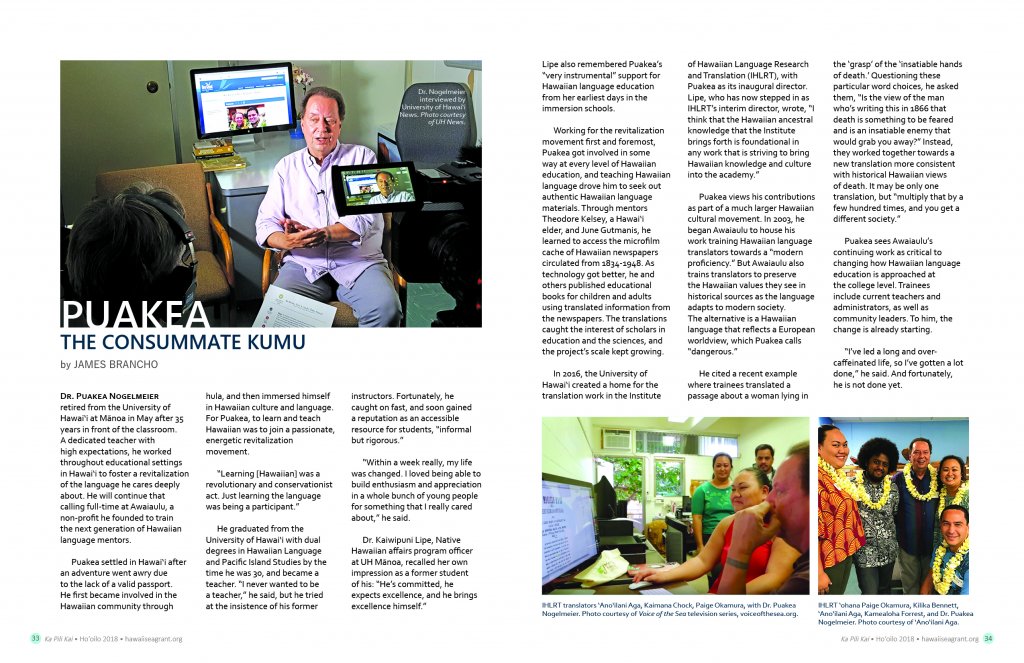Dr. Puakea Nogelmeier retired from the University of Hawaiʻi at Mānoa in May after 35 years in front of the classroom. A dedicated teacher with high expectations, he worked throughout educational settings in Hawaiʻi to foster a revitalization of the language he cares deeply about. He will continue that calling full-time at Awaiaulu, a non-profit he founded to train the next generation of Hawaiian language mentors.
Puakea settled in Hawaiʻi after an adventure went awry due to the lack of a valid passport. He first became involved in the Hawaiian community through hula, and then immersed himself in Hawaiian culture and language. For Puakea, to learn and teach Hawaiian was to join a passionate, energetic revitalization movement.
“Learning [Hawaiian] was a revolutionary and conservationist act. Just learning the language was being a participant.”
He graduated from the University of Hawaiʻi with dual degrees in Hawaiian Language and Pacific Island Studies by the time he was 30, and became a teacher. “I never wanted to be a teacher,” he said, but he tried at the insistence of his former instructors. Fortunately, he caught on fast, and soon gained a reputation as an accessible resource for students, “informal but rigorous.”
“Within a week really, my life was changed. I loved being able to build enthusiasm and appreciation in a whole bunch of young people for something that I really cared about,” he said.
Dr. Kaiwipuni Lipe, Native Hawaiian affairs program officer at UH Mānoa, recalled her own impression as a former student of his: “He’s committed, he expects excellence, and he brings excellence himself.”
Lipe also remembered Puakea’s “very instrumental” support for Hawaiian language education from her earliest days in the immersion schools.
Working for the revitalization movement first and foremost, Puakea got involved in some way at every level of Hawaiian education, and teaching Hawaiian language drove him to seek out authentic Hawaiian language materials. Through mentors Theodore Kelsey, a Hawaiʻi elder, and June Gutmanis, he learned to access the microfilm cache of Hawaiian newspapers circulated from 1834-1948. As technology got better, he and others published educational books for children and adults using translated information from the newspapers. The translations caught the interest of scholars in education and the sciences, and the project’s scale kept growing.
In 2016, the University of Hawaiʻi created a home for the translation work in the Institute of Hawaiian Language Research and Translation (IHLRT), with Puakea as its inaugural director. Lipe, who has now stepped in as IHLRT’s interim director, wrote, “I think that the Hawaiian ancestral knowledge that the Institute brings forth is foundational in any work that is striving to bring Hawaiian knowledge and culture into the academy.”
Puakea views his contributions as part of a much larger Hawaiian cultural movement. In 2003, he began Awaiaulu to house his work training Hawaiian language translators towards a “modern proficiency.” But Awaiaulu also trains translators to preserve the Hawaiian values they see in historical sources as the language adapts to modern society. The alternative is a Hawaiian language that reflects a European worldview, which Puakea calls “dangerous.”
He cited a recent example where trainees translated a passage about a woman lying in the ‘grasp’ of the ‘insatiable hands of death.’ Questioning these particular word choices, he asked them, “Is the view of the man who’s writing this in 1866 that death is something to be feared and is an insatiable enemy that would grab you away?” Instead, they worked together towards a new translation more consistent with historical Hawaiian views of death. It may be only one translation, but “multiply that by a few hundred times, and you get a different society.”
Puakea sees Awaiaulu’s continuing work as critical to changing how Hawaiian language education is approached at the college level. Trainees include current teachers and administrators, as well as community leaders. To him, the change is already starting.
“I’ve led a long and over-caffeinated life, so I’ve gotten a lot done,” he said. And fortunately, he is not done yet.
Browse Ka Pili Kai issues HERE


